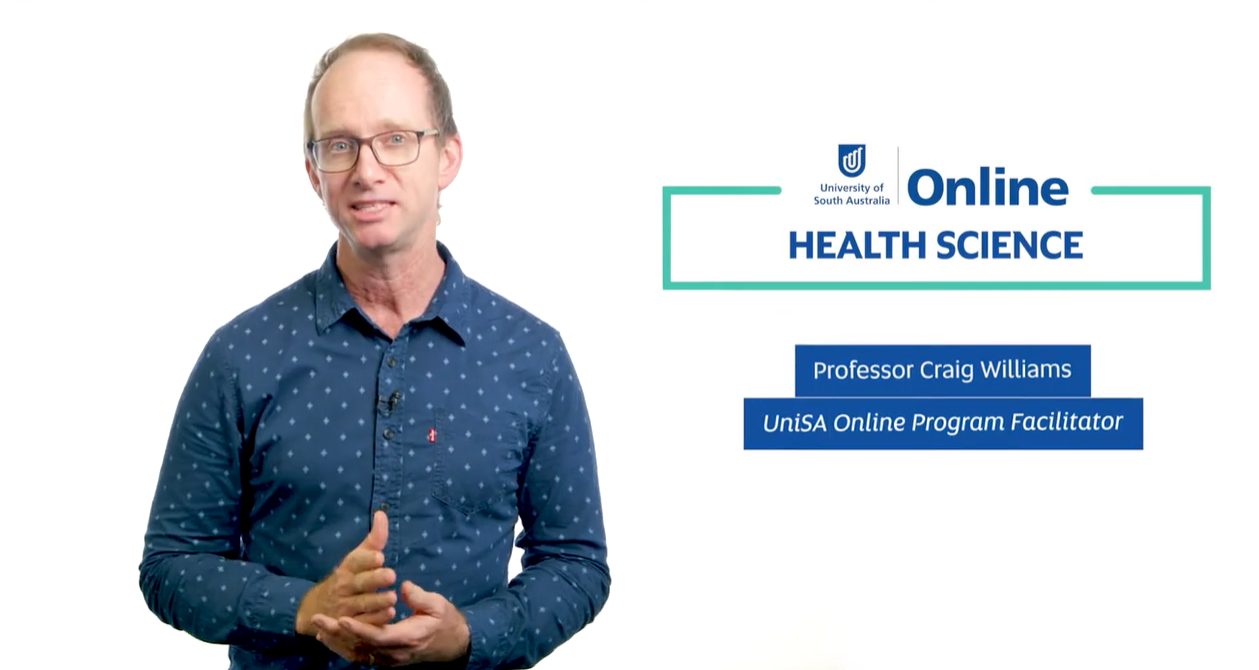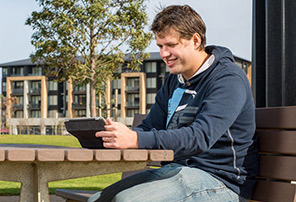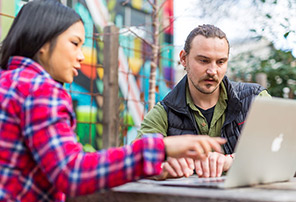You're viewing degree information for International students
You're an International student if you are:
- NOT an Australian or New Zealand citizen
- NOT an Australian Permanent Resident (including Permanent Humanitarian Visa holders)
Please remember your residency (the country you are currently in) has no impact on whether you are an Australian or International student.
UniSA Online degrees normally require international students to study outside of Australia. If you would like to study a UniSA Online degree within Australia, your visa conditions will need to allow online study. For advice on eligibility to study onshore in Australia, please contact us.
Bachelor of Health Science
Degree Level Undergraduate
Year 2025
-
View full entry requirements Hide full entry requirements
Entry requirements
Admission criteria
The admission criteria have been grouped to assist you to easily find the information most relevant to your circumstances. However, you may fit into more than one and the university will consider applicants against each of the relevant criteria.
Certain conditions apply. For more information refer to Appendix 4 of the University's Selection and Entry policy.
Applicants are required to meet one of the following criteria with a competitive result:
Higher education study
* successfully completed equivalent to a minimum of half a year of full-time study of a higher education program at a recognised higher education provider
OR
Vocational Education and Training (VET)
* completed an award from a registered training organisation at Certificate IV level or above
OR
Work and life experience
* passed a UniSA Online literacy and numeracy test and have relevant work experience;
* completed a 12-month UniSA Foundation Studies program or equivalent; or
* qualified for Special Entry
OR
Recent secondary education
* completed a secondary education qualification equivalent to SACE, such as an interstate year 12 international qualification with a competitive selection rank (ATAR)
Essential requirements for admission
Prerequisites
NoneAssumed Knowledge
NoneEnglish language entry requirements
In addition to meeting academic entry requirements, international students who speak English as a second or additional language must also meet the University's English language entry requirements. The minimum language requirements for this program are:English language testPlease access the following link for a comprehensive list of English language tests accepted by UniSA and other important information in relation to meeting the University’s language requirements: English Language Equivalence Table (PDF)- IELTS total [6.5]
- IELTS reading [6.5]
- IELTS writing [6.5]
- IELTS speaking [6.5]
- IELTS listening [6.5]
Admission Requirements by Country
Kenya KCSE (average) B Malaysia STPM (best 3) 6 Malaysia UEC 32 Norway GPA 2.8 Pakistan HSSC 75 Sri Lanka A Levels (best 3) 6 Sweden GPA 12.5 UK Board GCE A Levels/HK Board 6 Vietnam 7 Australia 65 IB (best 6) 26 USA SAT (1600) 1050 India (best 4) State Board 70 India (best 4) Central Board 60 HKDSE 15 Nepal NEB 2.41 Bangladesh HSC 3.5 Canada High School (OSSD) 60 Eynesbury FSP 310 German Abitur 3.8
Degree overview
- Study a generalist health science degree and build a solid foundation in human health.
- Gain a holistic understanding of health, human biology, and the healthcare system.
- Choose to continue your studies with UniSA Allied Health degrees such as Physiotherapy, Medical Radiations, and Occupational Therapy.
- Study course content that is informed by current research and leading-edge developments in the health sector.
- Graduate with an in-demand transferable skillset required in cross-disciplinary and multi-disciplinary roles in the health sector.
- Join a university ranked in the top 5 in Australia for graduate careers in health.1
1Ranked #3, ComparED (QILT) Graduate Outcomes Survey 2020-22, Rehabilitation – Overall Employment Indicator (Domestic Undergraduate). Public universities.
Snapshot

Study On Demand – a 100% online health sciences degree designed specifically for online learning. Take full control over your study – access support seven days a week, plan your study to fit around your life, view learning resources 24/7, and log into the interactive online environment anywhere, any time and on any device.
Forge your path in health with UniSA Online’s Bachelor of Health Science. This is a three-year generalist degree that will provide a pathway into a diverse number of careers in the ever-growing healthcare and health services sectors. You’ll gain a holistic understanding of health, human biology, and the healthcare system. Study core courses in anatomy, social sciences, psychology concepts, health promotion, project management, and health research. Develop the skills to adapt and respond to challenges in human health settings in Australia and around the world.
The Bachelor of Health Science is a flexible degree that allows you to undertake a range of specialisations in areas outside of the health field. Become a social media expert in health communications, develop healthcare marketing and communications campaigns, work as a health journalist, or specialise in health services in the criminal justice sector. You’ll also have the option to choose from a variety of electives in complementary areas such as Health Administration, Communication, and Ageing and Disability.
With a solid foundation in health, you’ll have the option to continue your studies in selected clinical fields and UniSA Allied Health degrees such as Physiotherapy, Medical Radiation, or Occupational Therapy. Or you may choose to enter the workforce after your studies and pursue a non-clinical role in the health sector. No matter where your career takes you, you’ll leave with the key skills and knowledge employers in the health sector are calling out for.
What you'll learn

A solid foundation of health science knowledge is extremely important for anyone working in the health sector. Fascinated by the human body? Study human biology and anatomy. Learn about muscles, nerves, bone structure and major blood vessels including the function of muscle groups of the limbs, spine trunk and thorax. Discover how body systems work together as well as how the body responds physiologically to disease. Learn the fundamentals of pharmacology, which looks at the study of drugs and their impact on living systems.
Project management skills are extremely important, especially if you choose to work in community development, population health, or health and wellbeing roles. Throughout your studies, you’ll learn to incorporate project management concepts, techniques and tools used within health and community sector organisations and workplaces.
You’ll also learn about the importance of research and evidence-based practice. The practice of research results in new knowledge and can be powerful enough to influence public policy and improve the health outcomes of entire populations. You’ll learn how research is conducted, how to choose an appropriate type of research design, and study approaches to do so ethically and with rigour.
Your health sciences degree will equip you with a transferable skillset that you’ll be able to apply in a wide variety of cross-disciplinary and multi-disciplinary roles in the health sector.
Why Bachelor of Health Science

Join a university ranked in the top 5 in Australia for graduate careers in health.1
UniSA is ranked above world-class for our research in health and medical sciences,2 and this excellence shines through in our teaching. We are inspired by challenges and opportunities, and partner with local icons and international organisations to deliver impact and change.
Through your studies, you’ll be exposed to contemporary practice and authentic assessments. Explore case studies relevant to the industry. You’ll study course content that has been informed by current research and leading-edge developments in the industry. Links between teaching and research will be threaded throughout your courses, particularly in research methods and project courses.
1Ranked #3, ComparED (QILT) Graduate Outcomes Survey 2020-22, Rehabilitation – Overall Employment Indicator (Domestic Undergraduate). Public universities.
22018 Excellence in Research for Australia (ERA).
Your career
Strong employment growth is predicted for the health care and social assistance industries, with 23% growth (equating to about 250,000 new jobs) expected by 20231.
As a result, there will be a high demand for job applicants with a broad knowledge of health and healthcare, but this won’t be limited to clinical health practitioners. There will also be an increase in non-clinical roles with skills in analysis, research, health promotion, and management in the health care context.
-
Health promotion officer: Plan and develop policies, strategies and projects that promote health at a local, regional or national level; develop the health awareness of individuals, groups and organisations; run community training courses and workshops; write and produce leaflets, posters, videos and brochures to aid health promotion in different environments; and ensure work is underpinned by up-to-date knowledge of health promotion theory.
-
Health project officer: Play a lead role in planning and delivering health and social care projects on time and within budget; engage with stakeholders regularly and report on the progress of project deliverables and risks; manage project budgets and resources; and develop reports and evaluate community programs, events and activities.
-
Health support worker: Work with clients from diverse cultural and social backgrounds, who have varied life experiences, physical abilities and skills; assist specialist teams and services in Aboriginal and Torres Strait Islander health; mental health; drug and alcohol services, refugee services, and homelessness; and use your knowledge of the local community to create opportunities for increased participation as a local citizen.
-
Health policy officer: Analyse healthy ageing policies and their effects on government and organisation programs and operations; implement and oversee research and analysis projects; develop strategies and proposals on policy development in designated reform areas; draft policy positions and statements; consult with relevant advisory groups, government officials and other key stakeholders; and collate and present project findings, data and policy positions in papers and reports.
-
Health and welfare services officer: Coordinate the professional and administrative aspects of health and welfare programs and services; develop and implement policies and standards for medical, nursing, allied health and administrative staff; coordinate and administer health and welfare programs and clinical services; liaise with other health and welfare providers, boards and funding bodies; and advise government bodies about measures to improve health and welfare services and facilities.
-
Community program developer: Research, plan and implement programs and activities that promote and increase participation of older people in communities; build networks and develop partnerships with community organisations to achieve positive outcomes for the local community, and work with people from diverse backgrounds and supervise and develop staff and volunteers.
-
Aboriginal health officer: Deliver high quality, comprehensive and culturally appropriate primary health care services in urban, regional, rural, and remote locations across Australia; develop tailored educational resources and training for community organisations and non-Aboriginal organisations; advocate for culturally respectful and needs-based approaches to improving health and wellbeing outcomes for Aboriginal and Torres Strait Islander people.
1https://www.nationalskillscommission.gov.au/insights/health-care-and-social-assistance-industry-analysis.
Thinking of studying soon?
Industry facts
Your study experience and support
Study On Demand
Our online career-focused degrees give you full control and ultimate flexibility over your study. It’s Study On Demand, on your schedule, on your terms.
- Designed specifically for your online learning
Designed by a team of academic and online experts, our course materials are delivered in an interactive way using innovative digital technology and state-of-the-art teaching and learning resources. - Study when it suits you
Our online degrees support students who lead busy lifestyles. With four start dates a year in January, March, July and September there is no need to interrupt your life. - Take control of your study schedule
With all content available from day one of your course, you have the power to plan your study schedule in advance. - Finish each course in 10 weeks
Our courses are delivered within 10-week terms to keep you motivated throughout your degree. Study two courses a term or just one. - 100% online study
You won’t need to come onto campus for coursework, assessments or exams. Complete all study for your degree where it suits you. - Get the help you need
Whether you need help with course content or assessments, we offer the academic support and services you need to be successful in your studies. - Adjust your study to your life
There’s no need to interrupt work and family life or spend money on travel and student accommodation. Organise study around your life. - Learn from world-renowned academics
Get a degree that’s designed and taught by leading academics and industry professionals. - 100% online interactive learning environment
Our interactive online learning environment supports all your study needs. Log in anytime, on any device, wherever it suits you. - Access a library of over 700,000 digital resources
Access a library of more than 700,000 digital resources including e-books, videos and journal articles. Our Ask the Library virtual service can help you locate, access, evaluate, use and reference a range of information resources.
What others are saying
IT Requirements
Generally, any desktop or laptop computer purchased in the past three years should be capable of meeting your online learning needs. While mobile devices such as tablets and smartphones will be able to access most of your online course content, there are likely to be elements of most courses where we recommend you use a desktop or laptop computer. Your computer should be able to:
- run a modern browser (Microsoft Edge, Firefox 24, Safari 5, or Chrome 32 or later versions)
- run Java
- run programs to create documents, spreadsheets and presentations
- use a web camera and headset (or ear pods with microphone)
- Some UniSA Online degrees require an online exam. The online exam software – Remote Proctor Now – has specific capability requirements. Please refer to the system requirements prior to conducting your exam to ensure your computer is compatible.
Access free IT software and resources
As a UniSA Online student, you'll:
- Get free access to the full Office 365 ProPlus suite, which includes full versions of Word, PowerPoint, Excel, Outlook, OneNote, Publisher, Access and Lync software. Install the full suite on up to five different devices (PC and Mac compatible).
- Get 1Tb of personal storage that syncs with your PC or mobile device through OneDrive - it's like an extra hard drive that allows you to open any of your files from any of your devices, whenever you need them.
- Get free access to LinkedIn Learning - Access more than 5000 video courses on a broad range of topics such as: the Microsoft Office suite, time management and study skills, health and wellbeing, communication and presentation skills, photography, film making and designing your own games or mobile apps.
- Be able to connect with others using Microsoft Teams, Yammer and the Outlook Web App.
There are some degrees that have specialised software requirements. We've made this software available to students to access for free - you'll be able to download and install any of the required programs on your own device anywhere and anytime. See if your degree requires specialised software.
Check your device
Our computer system test will determine if your device has the base system resources and software required to study online. It'll also check the speed of your internet connection.
See if your computer, laptop or device is all set up and ready to go – it takes just a few seconds.
The application process is easy – just follow these simple steps:
-
Submit an online enquiry
If you're ready to apply, the first step is to fill out and submit our online enquiry form. Here you'll be asked a series of questions to see if you're eligible. Following your online enquiry, one of our Degree Advisers will contact you at your preferred time to discuss the application process.
Enquire now > -
Speak to a Degree Adviser and start your application
If you're eligible, you'll receive an email outlining the entry requirements and the relevant documentation you need in order to be considered.
In order to verify your academic qualifications, you'll need to upload relevant documents like your official parchment, certificates or transcripts. If you have work experience, you will need to upload your CV as well as any other documents like work references, professional recognition or accreditation or your training certification.
Your email will contain information on the specific documents you need to provide as well as a link to begin your application. You'll be asked to create an account and set your own password.
-
Complete your application and send through your documents
In order to proceed with your conditional offer, you’ll need to complete your application and provide required evidence of your previous study or work experience.
Enquire now >
Alternative Pathways
- UniSA College Diploma in Health
- UniSA College Undergraduate Certificate in University Studies (Health)
- UniSA Online UniStart
-
When should I apply?
UniSA Online degrees start four times a year in January, April, June and September. There are key application dates for each term. If you're looking to apply for credit, there are different closing dates you need to be aware of, so it's always best to double check. Key dates can be found at unisaonline.edu.au/key-dates.
-
Do I have to be online at set times?
All of our courses are asynchronous, meaning you choose when to study, whenever it suits you. However, if your degree has online exams, you will need to sit these at a designated date and time. Some courses may also require you to speak to your academics via phone or online communication channels at a mutually agreed time as part of your assessment.
-
What academic support is available?
Our academics are available seven days a week, including weeknights. Throughout your degree, you’ll be supported by our highly experienced academic team of Online Course Facilitators and casual academics. Our teaching team will guide you through your learning and ensure you have an outstanding, high-quality education.
They can help you with your course materials and assessments, provide feedback on your work, assist you with referencing, and can answer any other course-specific queries.
You’ll be able to contact your academics via email, online discussion forums and live messages in the online learning environment. You can also communicate in real-time and chat face-to-face with your academics online.
If you need after-hours learning support, Studiosity is a great resource that can help you with your writing, academic language, grammar and referencing. You’ll also be able to chat online with a Studiosity online adviser.
-
How is my degree structured?
Full-time students study two courses each term. It makes earning a degree completely achievable, especially if you’re working. Your degree is delivered over four terms each year. Each term runs for ten weeks with two-week breaks in between each term.
You’ll also have the option to go part-time, or switch between the two. If you need to take a break in your study, that’s an option too. We recommend speaking to your Student Adviser who can help you update your study plan and check when your courses are offered.
-
What career prospects do I have with my university qualification?
Our degrees are designed in conjunction with industry experts, employers and professional associations, and informed by the latest developments in your field. You will graduate with in demand skills and up-to-date knowledge required by industry.
You will be studying with a university known for its employment outcomes. Your UniSA degree is more than just a piece of paper – it will prepare you to start your career, or take it to the next level. UniSA's online students have graduate employment rates well above the national average.*
UniSA Online qualifications follow the same Government Higher Education Standards Framework as our on-campus degrees. The parchment you receive at the end of your degree will be the same as any other University of South Australia student.
*UniSA External UG full-time employment rate 83% Graduate Outcomes Survey 2018
-
What are the main differences between online, on-campus and distance education?
The knowledge you gain from each mode of study is the same – it's how you get there that's different. When you study online, everything from your course material to weekly activities and assessments are fully online. You'll communicate with academic staff and students via live messages, online discussion forums and email.
Studying on campus requires students to physically come on to campus at specific times to attend lectures, tutorials and practicals. On-campus students have face-to-face contact with academics and fellow students and also communicate via email and online discussion boards.
Distance Education involves physical course material packages being sent to students, usually print based but occasionally audio or video. Communication is usually via telephone, mail and email. In today’s digital era, distance education has been superseded by online education.
More FAQs








